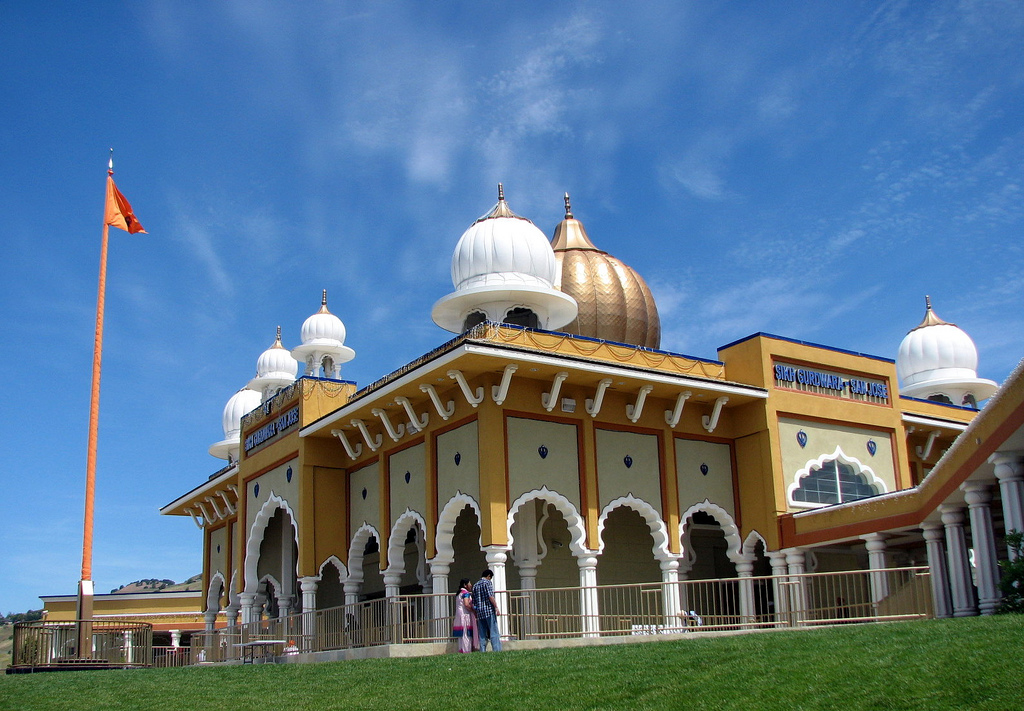
Gurdwara, (Punjabi: “doorway to the Guru” in Sikhism, a place of worship in India and overseas.
The Gurdwara contains on a cot under a canopy a copy of the Adi Granth (“First Volume”), the sacred scripture of Sikhism. It also serves as a meeting place for conducting business of the congregation and wedding and initiation ceremonies. The more historically important gurdwaras serve as centres of pilgrimage during festivals. A communal dining hall (langar), in which meals are prepared and served to the congregation, and frequently a school are attached to the gurdwara. Every Sikh family endeavors to set aside one room of the house for the reading of the Adi Granth, and that room is also called a gurdwara.
The key area of a Gurdwara is a spacious room housing the Sri Guru Granth Sahib (“The Granth as the Guru”; also known as the Adi Granth). The community gathers there to participate in devotional activity that typically includes recitation (path) of scripture, singing of scripture to musical accompaniment (kirtan), and its exegesis (katha). Toward the closing of the devotional session, a supplication (ardas) is made in which the Sikhs remember their history, seek divine blessings in dealing with their current problems, and reaffirm their vision of establishing a state in which Sikhs shall rule (Khalsa Raj). The service ends with a hymn read from the Sri Guru Granth Sahib, which is interpreted to be the divine reply (hukam) to the congregation’s supplication.
The key area of a Gurdwara is a spacious room housing the Sri Guru Granth Sahib (“The Granth as the Guru”; also known as the Adi Granth). The community gathers there to participate in devotional activity that typically includes recitation (path) of scripture, singing of scripture to musical accompaniment (kirtan), and its exegesis (katha). Toward the closing of the devotional session, a supplication (ardas) is made in which the Sikhs remember their history, seek divine blessings in dealing with their current problems, and reaffirm their vision of establishing a state in which Sikhs shall rule (Khalsa Raj).
The service ends with a hymn read from the Sri Guru Granth Sahib, which is interpreted to be the divine reply (hukam) to the congregation’s supplication. Having paid respects to the Sri Guru Granth Sahib and participated in ritual glorification of God, they then discuss day-to-day problems facing the community.
The Gurdwaras associated with the Sikh Gurus’ lives or their activities serve as destinations for Sikh pilgrimage. The leading gurdwaras among those are the Harmandir Sahib, or Golden Temple, in Amritsar in Punjab state; the five takhts (centres of religious authority) located in Amritsar (Akal Takht, the main centre), Talwando Sabo (near Bathinda), and Anandpur (all in Punjab), Patna in Biharstate, and Nanded in Maharashtra state; and the birthplace of Nanak, the first Guru and founder of Sikhism, at Nankana, now in Pakistan.
During the period of persecution of the Sikhs by the Mughal dynasty, the management of some gurdwaras (and the considerable lands and funds attached to them) passed into the hands of Hindu caretakers (mahants). After years of i ncreasing agitation on the part of the Sikhs, the British government passed the Sikh Gurdwara Act in 1925, returning control of the gurdwaras to the Sikhs. The gurdwaras of historic importance are now managed by an elected body known as the Shiromani Gurdwara Prabandhak Committee (Supreme Committee of Temple Management).
The Sikh place of worship, or Gurdwara, is more than a place of worship. It has historically served as a refuge for the homeless and the destitute. Gurdwaras usually display the Nishan Sahib, a saffron-colored triangular flag bearing the khanda, the symbol of the Sikh faith. Visitors, irrespective of their religion, are offered shelter, comfort, and food. The prerequisites for entering a Gurdwara are removing shoes and covering one’s head with a handkerchief, scarf, or other cloth.
In a Gurdwara, no special place or seat may be reserved or set aside for any dignitary, as all are considered equals. The service consists of singing of the liturgy, as well as the exposition of Sikh history, tradition, and theology. Non-Sikhs are always welcome. Sikh gurdwaras all over the world usually run free community kitchens, which provide meals to all. These kitchens are run and funded by volunteers. In traditional Indian society, people of high and low caste were rigidly segregated.
To combat this social problem, the Sikh community kitchen, or langar, requires everyone to sit side by side and eat together, thereby teaching the concept of equality by shattering all barriers of caste and class. Every major city in the United States and Canada has Sikh gurdwaras and they are open to all.

